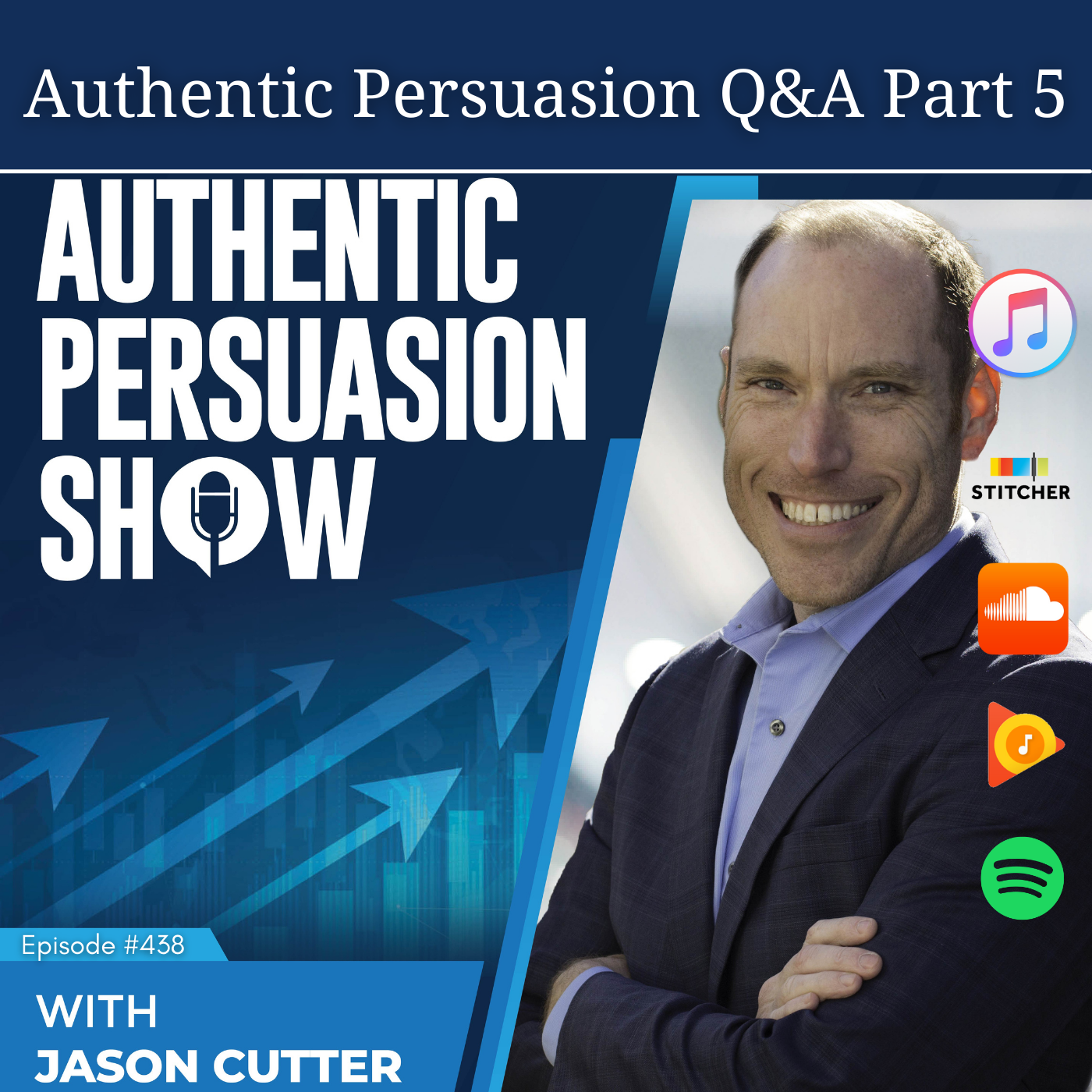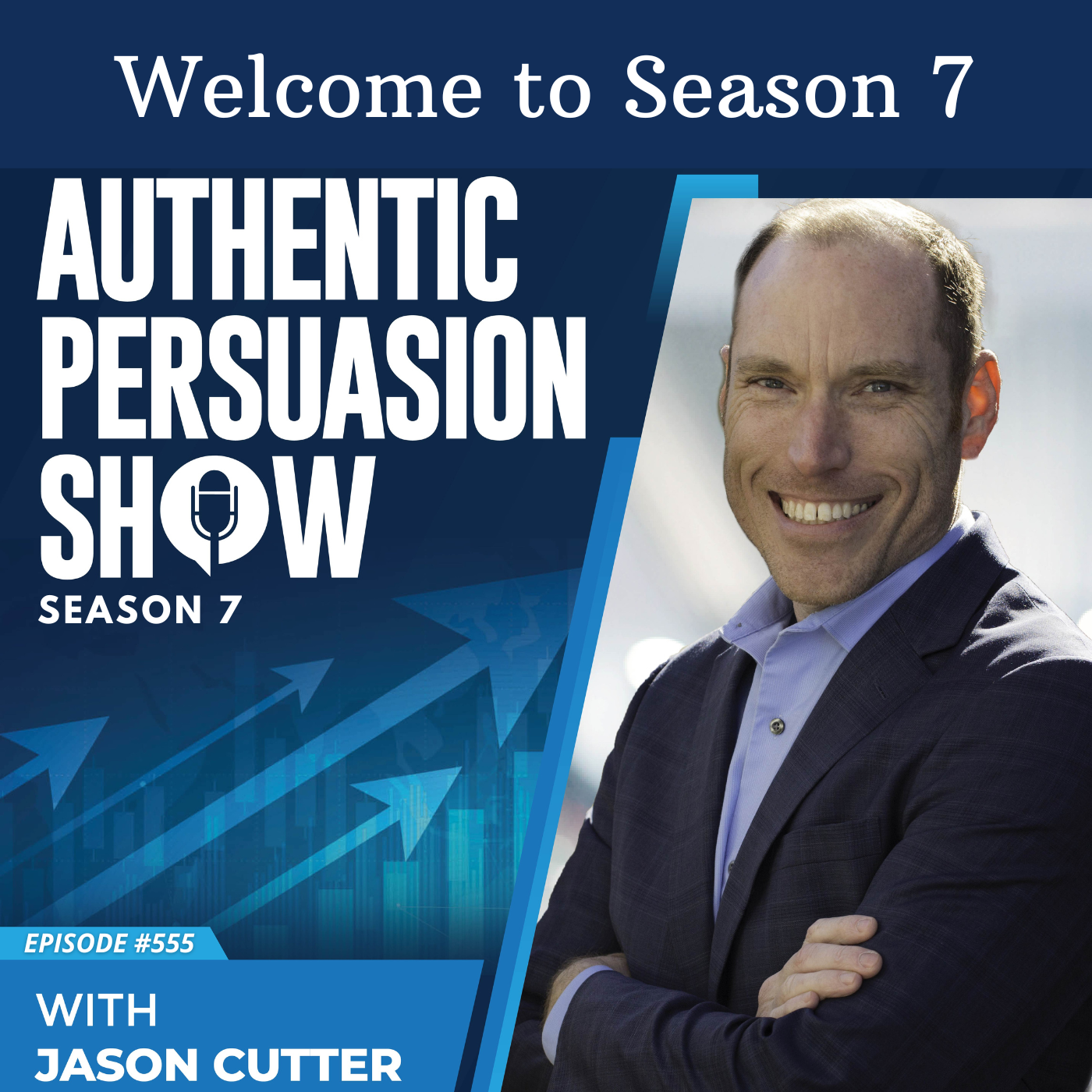Episode Transcript
Welcome to The Authentic Persuasion Show. On this episode, I want to replay part of a previous show. Maybe you heard the original full-length episode, and this could be a great refresher and reminder, or maybe this is your first time hearing this content, and the timing could be just right to help you leverage authentic persuasion today in your role.
No matter what, here's to your success. This is The Authentic Persuasion Show.
I mention this a lot. I reference this a lot. Medical professionals because pretty much everyone can relate to going to the doctor at some point in their life and having seen doctors they liked go through a process, even if you didn't think about it as a process, even if you don't think about it as sales.
If you think of the ones that you liked and the doctors who gave you a good experience, not just a good diagnosis and a good prescription and took away your pain or helped you in some way, but the ones that were the experience felt good and you liked that experience. And then most likely, we've all had experiences where we didn't like the doctor.
Maybe they were really effective. Maybe they were good at solving my pain, didn't like the experience. And so we're going for the first one here, and that's the key, but the key is to have that transition like a professional would do to move from this segment of the conversation to this segment and to keep it moving forward.
So that is the key. So make sure you get those transitions again. Email me if you want help with that. I have a guide to help with building those transitions so that you can put those in place and have those.
Most of the time, what I found is that if you struggle with closing deals, if you want to close more deals and you find yourself more in order taking mode than quota breaking sales professional mode, one of the best things to do is to put some transitions in place so that you can just keep things moving forward instead of floundering or hoping or thinking that the customer is just going to ask you enough questions that you can then move it forward.
Hey, should I buy this? Yes, of course. And then you're moving forward. So have those transitions in place.
All right, this is another important thing, and this, it's a tough tendency, especially for people in sales, especially people who are struggling with sales and selling effectiveness is. How much talking should you be doing?
And this is a good time to make sure to put in the talking ratio for success. And it doesn't have to do with just rapport. It's actually your whole conversation. And I will, I'm going to add this as well. This is not just about sales. And if you are a listener of my podcast, The Authentic Persuasion Show, and a long-time listener from when it was called the sales experience podcast, I ended every show by saying everything in life is sales, and people remember the experience that you gave them.
And that's important because these things I'm talking about right now. Yes, I'm applying it to sales. I'm helping you. If you're a sales professional or a solopreneur and you have to sell your own services, that's who I am speaking to. And we are all humans, and everything in life is sales and persuasion.
And every conversation that you're doing in business or in life is with another human. And these same things apply. If you want to have effective communication and effective relationships, where people see you differently and have a different experience in that relationship or that conversation. All of these things apply, especially this part, which is talking ratio for success.
The unfortunate side is that we're all humans. So what that means is most people want. To talk about themselves. Most people see themselves as the center of their universe. We all, and we all meaning all of us, including myself. We all have the tendency because of our primal side of our brain, which I've talked about many times now in the previous six sessions, we all have the ability to default to thinking that we are the hero.
Of our own story. We are at the center of our story. We are the hero and then everyone else is just role players, right? And for most people, it's actually not true. Yes, we are the center of our story, but are we the hero of the story or are we just going through it? If everyone thinks they're the hero of the story, then who's really the hero.
The challenge is that our brain puts us in the middle. Our brain cares about our survival. We want to be a part of the group, which is what I talked about in the past and us being in a tribe. But our brain still sees us in the middle. Our survival is important. Our survival is up to us. We are at the middle of everything.
And that's it. The challenge is when you put two humans together who are not careful or aware of those tendencies, what can happen. And I see this a lot, not just in sales in life, is that both people just want to talk about themselves. Both people want to share their things or talk about their stuff or have the conversation mostly about them.
Because again, we default to being ourselves and looking at ourselves again as the center of the universe as the hero of our own story. And we've all experiences, we've all experienced where we're talking to somebody. It could be somebody that we know, somebody we just met, it ranges all over. I see it all the time, and either they won't stop talking about themselves or if they do stop talking about themselves and they ask you a question as you're voicing your answer, you can see it in their face that they are literally just waiting for you to shut up so that they can jump in.
With something they're thinking about or one-upping you. Yeah, it was just on this vacation. You can see it in their eyes. Like they want to say, yeah I was just here and I just did this. Or they have some comments or they want to relate it to something about themselves. I find myself doing that as well because as people are sharing things, I'm like, Oh, that's awesome.
It reminds me of this. And it reminds me of that. And that's okay. The challenge is though, is it doesn't make that other person feel like you care about them. When somebody does that to me. It makes me feel like they don't care about me. They just care about themselves, and that's not as much fun to be around.
I'm not saying it needs to always be about me, but there should be a balance, right? I care about you. I asked you questions. I want to know about you. I want you to care about me, ask me questions and listen as I'm talking and go back and forth. So it's more equal.
![[709] The Importance of Transitions in Sales Conversations](https://episodes.castos.com/salesexperiencepodcast/images/1629074/c1a-4d8w-wnv68w86hq7p-gpr2oe.png)


